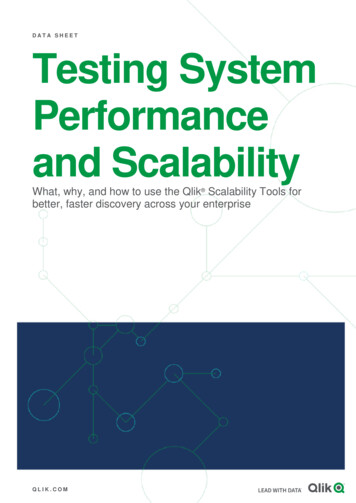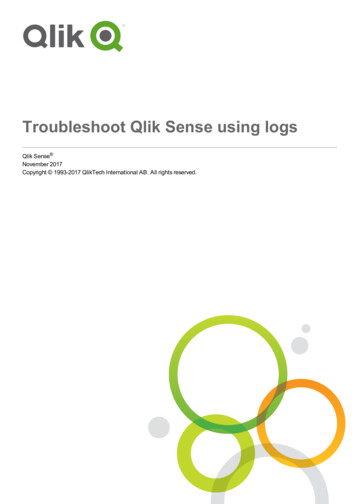
Transcription
Making Sense ofLead ManagementSpark SeriesA NINE-M INUT E R E AD
SECTION 01What is leadmanagement?Lead management is the process ofidentifying, qualifying, engaging, andmanaging potential buyers.A comprehensive B2B marketing strategy alwaysincludes a game plan for lead management.Lead management starts with lead generation,which happens when prospects indicate interestin your brand’s products and services. Fromthere, marketing teams nurture them until theybecome customers.The lead generation process involves variousmarketing tactics, such as social media, blog posts,technical papers, advertisements, and webinars.Potential customers respond to your marketing bygiving their contact information in exchange forinformation. At this point, they become a sales lead.Lead management programs focus on buildingprospect interest and engagement as leads movethrough the sales cycle and combine two vitalaspects of sales and marketing: lead scoring andlead nurturing.Making Sense of Lead Management2
Lead scoring is an objective ranking of onelead against another according to how interestedor close they might be to making a purchase.It helps marketing and sales professionals identifywhere each prospect is in the buying process andfollow up accordingly.Lead nurturing helps you develop relationshipswith your prospects. When you execute the processsuccessfully, you establish buyer preference foryour solutions while you gain an understandingof buyer timing. But this will only be possible ifyour lead nurturing programs deliver contentof sufficient value and interest to prospectsthroughout the sales process.32%32% of B2B marketerssay driving more leads isa primary objective oftheir digital strategy, and31% of B2B marketers saydelivering quality leads isalso a primary objective.1This guide will help you understand the benefitsof lead management, basic principles and bestpractices for lead scoring and nurturing, andhow to get started on building a successfullead management program.Making Sense of Lead Management3
SECTION 021Why lead managementmatters today38% of B2B marketers face challengesmanaging and tracking leads.1Prospects show interest in your brand in variousways. They download white papers and casestudies, follow brands on social media, subscribe tonewsletters, attend virtual events, and more.A successful lead management program recordsevery interaction a prospect makes with your brandto qualify and nurture leads. This provides salesteams with information on where a prospectis in the buying cycle and indicates which marketing campaigns and programs are successfullygenerating and nurturing leads and helpingmake conversions.Why is lead management important? A recentsurvey finds that marketers are currently facinglead management challenges.46%46% of marketers sayfewer sales opportunitiesare being generated.2Making Sense of Lead Management4
21%21% say marketing isgenerating fewer leads.214%14% say marketing leadsare not converting as well.2Investing in lead management allows marketingand sales teams to Focus on the right leadsPlace your focus on capturing and engaginghigh-quality leads. Add relevance when engaging with leadsSales reps can have meaningful, contextualconversations and engagements with leadswhen they have access to lead behavioral data. Improve productivity and maximize ROIRobust lead management systems automatically assign leads to the right sales rep so theycan focus on closing the sale.Making Sense of Lead Management5
Why lead scoring mattersAccording to a recent survey of B2Bmarketers, 40% of sales teams complainabout lead quantity, and 47% complainabout lead quality.1Marketing and sales agree upon a lead scoringprocess for defining lead quality, sales follow-up,and cross-departmental collaboration. An effectivelead scoring model prioritizes quality interactionsor activities that demonstrate high prospectinterest and delivers hot leads to the sales teamfor follow-up.An established lead-scoring practice gives yougreater control of your pipeline. The better youmeasure and understand the quality of your leads,the more predictable your pipeline and revenueforecasts will be. It becomes easier to see projectedshortfalls in revenue by territory, product line,and business unit. This allows marketing and salesteams to react appropriately by concentratingresources where they’ll have the greatest impact.Making Sense of Lead Management6
Why lead nurturing mattersNot every prospect is ready to buy right away.Some require more time, relevant content, andinformation before deciding to purchase.Lead nurturing focuses on converting contactsthat are already in your database. Organizationswithout lead nurturing processes see a considerabledrop-off in the number of leads they're able togenerate for their sales teams. Following up with andnurturing these leads should rank as a high priority.Also, note that lead nurturing can help upsell andcross-sell to existing customers. Since you alreadyhave an existing business relationship with them,it’s often easier to nurture a customer than a prospect.60%60% of B2B marketers believe theirlead nurturing strategies haveincreased conversion rates and sales.3Making Sense of Lead Management7
SECTION 031The basicsGenerate high-quality leads andmaximize sales opportunitiesInvesting in lead scoring and lead nurturing canimprove marketing and sales alignment, increaselead quality, drive conversions, and enable yoursales team to be more efficient and effective withtheir time.Lead scoring basicsWhat criteria should you use to score leads? It’sbest to keep it simple. Scoring too many criteria canmake it difficult to determine which values definethe score.Start with two of the most commonly used scoringdimensions and add more criteria as needed: Prospect identity: The prospect’s job title,position, industry, and geography Prospect interest: How many times havethey visited your website, clicked through onyour emails, registered for and attendedyour events, downloaded content, followedyour brand on social media, and so onMaking Sense of Lead Management8
Then consider Documenting how likely the lead is tobecome a customer Determining the factors that definea sales-ready stage of qualification Defining how important these factorsare in relation to one another Assigning a tiered set of correspondingvalues for each factorScore a lead based on their level of engagement.If it's high enough, it goes to sales. If a leadisn't ready to buy yet, nurture them until they are.Making Sense of Lead Management9
Lead nurturing basicsNow that you understand the benefits of leadnurturing, consider using these tactics to cultivatemore meaningful conversations with leads:Collect dataDesign multichannel marketingexperiences with enough touchpoints tocapture prospects' behavioral information,allowing you to tailor your marketingtowards their needs, interests, andpreferences.Segment your leadsBuilding lasting relationships based ontrust requires extensive knowledge ofyour prospects. Only then can youprovide engaging and relevant content,messaging, and offers. Segmentationallows you to personalize by title, role,industry, or sales stage in your messaging.PersonalizePersonalize whenever possible. Respondto buyer signals and provide relevantcontent for every stage of the cycle.Making Sense of Lead Management10
SECTION 041What’s next?Now that you understand the basics of leadmanagement, lead scoring, and lead nurturing, there are some steps you can taketo optimize your approach for better results.Here are some ideas and techniques you canapply to up your lead management game.Increase awareness of prospect influencesProspects receive more messages, information, andeducation during the buying process than everbefore. And peer-to-peer channels will continue togrow in relevance. Understanding how and wherea prospect discovered a message should influenceyour lead scoring and nurturing programs.Experiment with scoringLooking at different ways of scoring leads canunlock powerful opportunities. You might try: Content-based scoringFocusing on white papers, productinformation, and customer testimonialsinstead of download activity.Making Sense of Lead Management11
Account-level scoringScoring leads to pinpoint when a certain role isappearing in the buying cycle. Customer scoringAnalyzing all customer touchpoints to identifyopportunities and risks throughout the lifecycle. Opportunity scoringAnalyzing a lead's behavior through themiddle of the pipeline to predict the likelihoodof an opportunity closing.Adopt predictive modelingYour lead-scoring model must remain closely alignedto your sales and marketing processes (even asthey evolve). Predictive modeling tools allow you toconstantly monitor prospects’ behavior andunderstand how your model may need to change.Making Sense of Lead Management12
Deliver customized multichannel experiencesNurture leads on their preferred channels and createa consistent experience across multiple channelsif the lead responds best to this approach.Drive the conversation with dataThe more you know, the more relevant your conversation will be and the better the chance of convertingyour prospect to the next stage. To help, aggregate insights from various sources (including CRM,LinkedIn, and marketing automation systems).Automate the buying cycleLeveraging marketing automation and CRM technology makes you more adept at tracking buying-cyclestages, reach leads with a message that resonates,and offers insights to help with their pain points.Making Sense of Lead Management13
SECTION 051Practical solutionsNow that you understand the basics,learn how to run an effective leadmanagement program.A three-step approach can set you up for successwith the technology, people, and processes neededto make lead management work.1. Align sales and marketing30% of B2B marketers list marketing and salesalignment as a top challenge to their overalldigital marketing strategy’s success.1 Alignmarketing and sales teams by agreeing upona sales process, defining the buying stagesand lead qualifiers, and establishingperformance metrics and goals.2. Capture lead dataFuel the lead manage-ment process bykeeping a record of every prospect thatengages with your brand. This can be doneby importing lists and auto-maticallycapturing lead information through form fillsand subscriptions, social media channels,and integrated applications.Making Sense of Lead Management14
3. Track performance and optimizeLeverage marketing automation to scoreand validate leads and route them appropriately. Measure the effectiveness of your leadgeneration, scoring, and nurturing programsby tracking where leads are coming in from,analyzing campaign results, and reviewingassociated pipeline and revenue. Usingthis insight, make the necessary updatesto optimize your lead generation andnurturing campaigns.Are you ready to spark your lead management program? Visit us to learn more.Making Sense of Lead Management15
To the experience-makerwho’s always moving forwardAt Oracle, we know great experiences comefrom great inspiration, and we’re providing thespark for your next idea. Packed with powerfulinfo, the Spark Series will get you up to speedon core CX concepts—such as product contentmanagement—quickly.Think of it as a way to hone your understandingbefore turning your eyes toward a new strategy.Because if anyone’s going to create CX gold, it’s you.What will you discover next? Analyst report: Gartner Critical Capabilitiesfor CRM Lead Management DataSheet: Oracle Eloqua Marketing Automation Blog: 4 Principles for Effective Lead ManagementMaking Sense of Lead Management16
About Oracle Advertising and CXMake every customer interaction matter by connecting all yourbusiness data across advertising, marketing, sales, commerce,and service. Oracle Advertising and Customer Experience.(CX) is a connected suite of applications that goes beyondtraditional CRM to help you create and nurture lasting customerrelationships. Build a complete view of every interaction andevery customer, no matter how and when they engage.Empower your entire business to deliver exceptional customerexperiences—from acquisition to retention—and everythingin between.Sources1. 2021 State of B2B Digital Marketing: Capitalize on Increased Budgets &Post-Pandemic Opportunities, WPromote (Complete form to download)2. 2021 B2B Marketing Trends Report: How to Augment the MarketingOrganization for a Digital-First Future, On24 (Complete form to download)3. Lead Nurturing Survey Report, Demand Gen (Complete form to download)oracle.com/cx/Copyright 2021, Oracle and/or its affiliates. All rights reserved.
What is lead management? Lead management is the process of identifying, qualifying, engaging, and managing potential buyers. . basic principles and best practices for lead scoring and nurturing, and how to get started on building a successful lead management program. Making Sense of Lead Management 3 .










